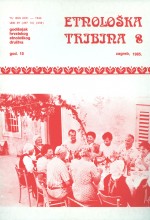Položaj etnologije u balkanologiji: eksplikacija i teze za balkansku etnologiju
The Position of Ethnology within Balkan Studies: Explication and Theses for a Balkan Ethnology
Author(s): Dagmar BurkhartContributor(s): Dunja Rihtman-Auguštin (Translator)
Subject(s): Customs / Folklore, Ethnohistory, Recent History (1900 till today), Cultural Anthropology / Ethnology, Higher Education , 19th Century, Inter-Ethnic Relations
Published by: Hrvatsko etnološko društvo
Keywords: Balkan; ethnology; cultural anthropology; folklore; socio-culture; volkskunde; völkerkunde; multi-ethnic situation;
Summary/Abstract: The author advances basic theoretical and practical assumptions of the curriculum of the Balkan ethnology course which she teaches in the Balkan studies program of the Frei Universität. One of them is the rejection of the obsolete division of culture into »material« and »spiritual« spheres, a postulate thoroughly criticized in recent German cultural theory. In many countries of Southeastern Europe, however, this conceptual division has led to institutionalized division of research, »material culture« being studied by one set of institutions, and »folk arts« by another. The roots of this schism can be traced to the different meaning and use of the 19th century terms folklore and Volkskunde. If the study of culture is understood as the investigation of: a) human ability to change its environment; b) a general social-historical process (macro-aspect); and c) specific culture(s) (micro-aspect), then the opposition of civilization as »material life« and culture as »spiritual life« indeed does not make sense. The author suggests that ethnology as a discipline differs from cultural anthropology in its focus on the culture of folk, that is, of subordinate social strata, while cultural anthropology is all-encompassing. Ethnology today is a social science which deals with the cultural aspect of general social phenomena, analyzing the causes and processes of the mediation of cultural values and their objective and subjective representations. Its goal is to help solve socio-cultural problems. Another antiquated and theoretically unsound concept of traditional ethnology is its division into »national« and »non-European« (Volkskunde and Völkerkunde). The concept is no longer in use in modem German ethnology. The Balkan ethnology curriculum which the author has designed is a necessary compromise between theoretical systematization and educational pragmatism. The subject is divided into three thematic complexes based on the relationships human being — material objects, human being — sign, and human being — human being, respectively. Furthermore, there are six problem aspects (tradition and innovation; cultural space and identity; folk culture and mass culture; cultural industry and creativity; mediation and communication; group and individual) which place the thematic complexes in social-historical context. The theses advanced for Balkan ethnology emphasize that multi-ethnic situation requires adequate research procedure; that its task is to investigate comparatively intra-ethnic and inter-ethnic social/cultural issues using historical-typological comparisons; that its theoretical is framework structuralism and communication science since the Balkan ethnology exists at the intersection of linguistics and other social sciences; that its goal is the comprehension of both the structure and function of cultural phenomena in their intra-ethnic and inter-ethnic contexts, and both their continuity and change; that the subject of the Balkan ethnology are basic strata of culture and society of Balkan ethnic units, i.e. social/cultural expressions of folk, understood as a process (folk as a social sub-system within various social formations); finally, that its long-term goal is the construction of a general model of the Balkan folk culture as a part of the European ethnology.
Journal: Etnološka tribina : Godišnjak Hrvatskog etnološkog društva
- Issue Year: 15/1985
- Issue No: 8
- Page Range: 5-28
- Page Count: 24
- Language: Croatian

